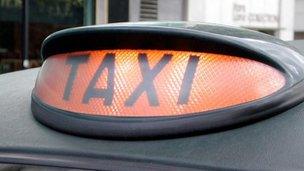Londonderry taxi drivers trained to treat medical emergencies
- Published

Taxi drivers in Derry have become the first in Northern Ireland to be trained as 'first responders' to some medical emergencies.
Twelve local taxi drivers have volunteered to deal with situations until the paramedics arrive.
Each has been equipped with a defibrillator, mobile phone and kit bag when on duty.
They will receive refresher training every six months.
North West Taxi Proprietors has teamed up with the Northern Ireland Ambulance Service (NIAS) and Western Health and Social Care Trust.
Taxi man Cyril Ming recently saved a child's life.
Positive
"We have been trained to calm people down, get them in a recovery position and make sure the ambulance has been called.
"A child was once choking and through my training I was able to help her. Things could have been a lot worse and this encouraged me to take on this taxi role voluntarily.
"The defibrillator will only give us a certain amount of guidance. Most taxi man are driving about one third of their shift. It's great that we can do something positive rather than sitting around. "
Mr Ming also had a heart attack recently - he says this influenced his decision to join the emergency taxi group.
"More taxi men should get involved. They shouldn't be scared of volunteering.
"My own situation is going to help me through it. I wouldn't want people going through what I went through."
A spokesperson for the Northern Ireland Ambulance Service said: "NIAS welcomes the establishment of this initiative which will complement existing ambulance provision in the city.
"First responder groups play an important role in providing immediate assistance to a casualty while ambulances, which will continue to be despatched as normal, make their way to the call to provide high quality clinical care to those in need."
Gerry Hamill from North West Taxi Proprietors said: "Speaking on behalf of the Heart of Foyle Steering Group, we're excited to be part of this innovative first responder scheme.
"Our taxi drivers are based within the community and I believe they are well placed to deliver this critical first response. This service is complimentary to the emergency service provided by the ambulance and 999 should always be called in an emergency."